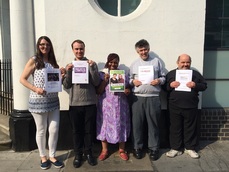Political parties launch 'easy read' manifestos to attract learning disability vote in general election
Inaccessible politics discouraged a majority of people with a learning disability from voting in local elections last May, so Mencap’s Parliamentary Affairs Assistant, who has a learning disability, contacted all the party leaders to ask them to produce Easy Read manifestos.
 As a result, the main five national political parties have launched accessible versions of their party manifestos for people with a learning disability. The Easy Read manifestos use simple language and pictures, which make it easier for people with communication difficulties to understand what each party stands for.
As a result, the main five national political parties have launched accessible versions of their party manifestos for people with a learning disability. The Easy Read manifestos use simple language and pictures, which make it easier for people with communication difficulties to understand what each party stands for.
The Conservatives, Labour, Liberal Democrats and UKIP have worked with leading learning disability charity Mencap to produce the Easy Read manifestos, and the Green Party has also produced an accessible version of their manifesto. All five manifestos have gone live on Mencap’s website and can be accessed on www.mencap.org.uk/easymanifestos
Ismail Kaji, Mencap’s Parliamentary Affairs Assistant, said: “Many people with a learning disability did not vote in the last election and we want to change that. Lots of people with a learning disability who didn’t vote in the local elections last year said that they didn’t know which party to vote for. This is no surprise as politicians use really complicated language and jargon that is hard to follow.
“The Easy Read manifestos use simple language and pictures, which make it easier to understand what each party is promising. This will mean that people with a learning disability feel more valued and included and understand why their vote counts.
“They can then make their own choice about who they want to vote for at the General Election on 7 May 2015. Our voices matter. Together, people with a learning disability and our families can make a difference.”
 Research for Mencap’s Hear my voice general election campaign shows that people with a learning disability want to vote, but many are excluded from the process and aren’t able to exercise their democratic right.
Research for Mencap’s Hear my voice general election campaign shows that people with a learning disability want to vote, but many are excluded from the process and aren’t able to exercise their democratic right.
This culture of inaccessible politics discouraged 64 per cent of people with a learning disability from voting in local elections last May. Of those who didn’t vote, more than half said they didn’t want to vote for any of the political parties because they didn’t understand what they stood for.
One of these individuals was 28-year-old Vijay Patel. Vijay felt excluded from politics because of the complex language that politicians use. He said: “I wasn't sure who to vote for in the last general election as all of the parties were against each another and used big words with lots of jargon. The government needs to make sure their information and policies are in easy read for people to understand what they’re talking about. I’m looking forward to reading the Easy Read manifestos and making sure my vote counts!”
Mencap’s Hear my voice campaign is encouraging people with a learning disability, their families and carers to tell their local candidates what matters to them and what they want to see change under the next government. To date, over 1,000 people have shared their stories with their local candidates.
More than 460 political candidates have signed-up to the Hear my voice campaign to say they are listening to the voices of people with a learning disability.
Find out more about the campaign by visiting www.hear-my-voice.org.uk
Latest News
 29-Jul-24
Dementia Bus gives carehome.co.uk staff insight into life with dementia
29-Jul-24
Dementia Bus gives carehome.co.uk staff insight into life with dementia
 01-Mar-24
Find out the top care homes in 2024
01-Mar-24
Find out the top care homes in 2024
 21-Mar-23
UK's top care homes in 2023 revealed
21-Mar-23
UK's top care homes in 2023 revealed
 03-Jan-23
carehome.co.uk launches free care helpline
03-Jan-23
carehome.co.uk launches free care helpline
 13-Dec-22
5 mins with Emily Whitehurst, chief operating officer for Constantia Healthcare
13-Dec-22
5 mins with Emily Whitehurst, chief operating officer for Constantia Healthcare